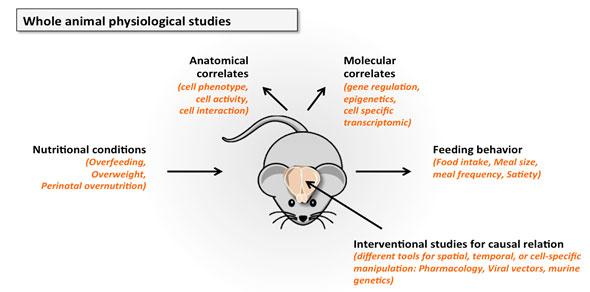



Assistant group leader
Téléphone : 03 80 68 16 77
Researchers
P. Andreoletti, M. Cherkaoui-Malki, F. Datiche, L. Merle, S. Savary, D. Trompier, A. VÚjux.
Enginneers and technicians
N. Bancod, V. Gigot, C. Gondcaille, L. Leret, F. LiÚnard, H. Mottous, E. Nedelec, B. Patris, V. Pires.
PhD students
T. Landre, M. Perrignon-Sommet, V. Schneider.
Trainees
S. Cuenot.
Key words : Neuroendocrinology, Hypothalamus, Synaptic plasticity, Melanocortin system, Food intake, Obesity research, Obesity predisposition, Epigenetics.
Thematic : Coupling molecular analysis, brain histology, pharmacology and gene manipulation in experimental murine models to investigate the neurobiological bases of feeding behavior and to identify molecules involved in energy homeostasis.
Research group in detail Open all tabs
Little is known about the plasticity of brain feeding circuits and its exact role in the maintenance of energy homeostasis, except that the synaptic plasticity in response to changes in the metabolic state is coordinated by hormonal signals and that altered connectivity is found in obese mice.

Project ANR NCAM2 : « Neural control of appetite and metabolism by neural cell adhesion molecule » (ANR- 13-JSV1-0003-01).
Research award from the Institut Benjamin Delessert
Research award from the Société de Nutrition
« Bonus Qualité Recherche à Université de Bourgogne-Franche Comté
Incitative funds from INRAE « métaprogramme SweetLipKid »
Schneider, N. Y., Chaudy, S., Epstein, A. L., Viollet, C., Benani, A., Pénicaud, L., Grosmaître, X., Datiche, F. and Gascuel, J. (2019). Centrifugal projections to the main olfactory bulb revealed by trans-synaptic retrograde tracing in mice. J. Comp. Neurol. Doi: 10.1002/cne.24846.
Jehl, F., Désert, C., Klopp, C., Brenet, M., Rau, A., Leroux, S., Boutin, M., Lagoutte, L., Muret, K., Blum, Y., Esquerré, D., Gourichon, D., Burlot, T., Collin, A., Pitel, F., Benani, A., Zerjal, T. and Lagarrigue, S. (2019). Chicken adaptive response to low energy diet: main role of the hypothalamic lipid metabolism revealed by a phenotypic and multi-tissue transcriptomic approach. BMG Genomics 20(1): 1033.
Prévost, G., Arabo, A., Le Solliec, M.-A., Bons, J., Picot, M., Maucotel, J., Berrahmoune, H., El Mehdi, M., Cherifi, S., Benani, A., Nédélec, E., Coëffier, M., Leprince, J., Nordqvist, A., Brunel, V., Déchelotte, P., Lefebvre, H., Anouar, Y. and Chartrel, N. (2019). Neuropeptide 26RFa (QRFP) is a key regulator of glucose homeostasis and its activity is markedly altered in obese/hyperglycemic mice. Am. J. Physiol.-Endocrinol. Metab. 317(1): E147-E157.
Prévost, G., Picot, M., Le Solliec, M.-A., Arabo, A., Berrahmoune, H., El Mehdi, M., Cherifi, S., Benani, A., Nédélec, E., Gobet, F., Brunel, V., Leprince, J., Lefebvre, H., Anouar, Y. and Chartrel, N. (2019). The neuropeptide 26RFa in the human gut and pancreas: potential involvement in glucose homeostasis. Endocr Connect 8(7): 941-951.
Brenachot, X., Nédélec, E., Ben Fradj, S., Boudry, G., Douard, V., Laderrière, A., Lemoine, A., Liénard, F., Nuzzaci, D., Pénicaud, L., Rigault, C. and Benani, A. (2018). Lack of hypothalamus polysialylation inducibility correlates with maladaptive eating behaviors and predisposition to obesity. Front. Nutr. 5: 125.
Brenachot, X., Gautier, T., Nédélec, E., Deckert, V., Laderrière, A., Nuzzaci, D., Rigault, C., Lemoine, A., Pénicaud, L., Lagrost, L. and Benani, A. (2017). Brain control of plasma cholesterol involves polysialic acid molecules in the hypothalamus. Front. Neurosci. 11: 245.




